Plan
1. Introduction
2. The meaning of the first and last name
3. General characteristics
4. Attitude of the Mayor to the service
5. The mayor as a person
6.Conclusion
The comedy "The Inspector General" had the effect of a bomb exploding in its time. In the pictures comic characters many saw themselves. The central object of criticism of the writer is the mayor, who leads a gang of bribe-takers. This image was created by Gogol with special care. The mayor from The Inspector General has become a textbook character in Russian classical literature.
Gogol was distinguished by his great skill in using “speaking” names and surnames. The mayor's name is very loud and sonorous - Anton Antonovich Skvoznik-Dmukhanovsky. Anton is translated from Greek as “opponent”, from Latin as “competitor”. That is, Anton Antonovich is a warrior in a square, waging an ongoing struggle.
The irony is that the fight is being waged against ordinary residents of the city. Through - from "through". A person bearing such a surname is able to find any loophole and easily avoid danger. Dmukhanovsky - from Ukrainian. “to swell” (to pomp, becomes arrogant). As a result, the mayor turns out to be an arrogant scoundrel and a rogue.
Anton Antonovich became a mayor as a result of many years of service, starting from the lower ranks. In a confusing bureaucracy Russian Empire this could only be done through bribes, denunciations and the lowest servility. Having reached the highest level, the mayor firmly took his place. He is well versed in all the behind-the-scenes machinations, capable of deceiving anyone and getting away with it.
The mayor behaves with stern dignity. Leading and guarding the same bribe-takers, he never stoops to them. Behind long years During his service, Skvoznik-Dmukhanovsky developed an incredible sense of danger. He has phenomenal resourcefulness. One of the obvious signs is a rapid change in mood. The mayor resembles a chameleon in his ability to instantly adapt to any situation.
The mayor depicted by Gogol is disgusting with his abuse of power. But the horror is that Anton Antonovich does not even consider himself guilty of anything. Having headed the government in the city, he sincerely thinks that he has unlimited rights. That’s why a mayor is needed, to execute and pardon his “wards” at his own discretion. The mayor knows very well what sins are committed by other officials. He covers them and thereby gains loyal allies.
The mayor as a person At first glance, Anton Antonovich is a formidable and strong figure. He keeps the whole city in fear. Any order of the mayor must be carried out immediately. However, the awareness of numerous abuses constantly keeps Anton Antonovich in suspense. The letter, and then the story of Dobchinsky and Bobchinsky, bring him out of the majestic peace. The mayor reveals his petty and cowardly essence. He is seized with real panic. In a hurry, he gives fussy orders, trying to put a box on his head instead of a hat. Fear of punishment becomes the reason for the mayor's mistake.
Throughout the comedy, he humiliates himself before the insignificant. Anton Antonovich's never-failing instinct fails. After Khlestakov's exposure, the mayor again takes on a menacing appearance, but the news of the arrival of a real auditor damages him swipe, turning into “a pillar with outstretched arms and head thrown back.”
Mayor in " " - collective image. Perhaps there was no scoundrel who combined all the qualities of Anton Antonovich. In any case, the real misfortune of Russia still remains the mayor’s favorite pastimes - embezzlement and bribery.
The character of the mayor in Gogol's comedy "The Inspector General"
The mayor, Anton Antonovich Skvoznik-Dmukhanovsy, is portrayed quite vividly in the comedy. He is one of the central figures, and it is around him and Khlestakov that the main action develops. The remaining characters are given in half-sketches. We only know their last names and status, otherwise these are people very similar to the mayor, because they are birds of a feather, live in the same county town, where “even if you ride for three years, you won’t reach any state.” Yes, they are not so important, otherwise they would overshadow all the “splendor” of the Governor’s figure.
We come across a lot of “speaking” surnames in Gogol. This technique is everywhere in his works. The mayor was no exception. Let's see what his last name tells us about his character. According to Dahl's dictionary, a drafter is “a cunning, keen-sighted, insightful person, a trickster, a swindler, an experienced rogue and creeper.” But this is obvious. From the first lines of the work we learn that the Mayor will never miss what floats into his hands, and he does not hesitate to take bribes, even with greyhound puppies. His caution also speaks of vigilance or perspicacity. In society, this is a decent head of the city who constantly goes to church, has a prosperous family and stands up for his residents. But let’s not forget that the drafter is also a swindler, and therefore he also oppresses merchants, and wastes government money, and flogs the people. There is also a second part of the surname. Let's open Dahl again and read that dmukhan is “pompousness, pride, arrogance. arrogance, swagger." And, indeed, Anton Antonovich has a lot of arrogance and swagger. How happy he was when he learned that his daughter was marrying not just anyone, but a minister: “I myself, mother, honest man. However, really, just think about it, Anna Andreevna, what kind of birds you and I have become now! huh, Anna Andreevna? High flying, damn it! Wait, now I’ll give all these hunters the time to submit requests and denunciations.” This is our mayor.
However, let’s see how the author himself describes Anton Antonovich to us in the author’s remarks “for gentlemen actors”. “The mayor, already old in the service and a very intelligent person in his own way. Although he is a bribe-taker, he behaves very respectably; quite serious; a few are even resonant; speaks neither loudly nor quietly, neither more nor less. His every word is significant. His facial features are coarse and hard, like those of anyone who began his service from the lower ranks. The transition from fear to joy, from rudeness to arrogance is quite rapid, as in a person with crudely developed inclinations of the soul. He is dressed, as usual, in his uniform with buttonholes and boots with spurs. His hair is cropped and streaked with gray.” Everything in these remarks is important; they allow us to understand how Gogol himself wanted to portray the hero, as opposed to how we, the readers, see him. Just as his last name can tell us a lot about the mayor, so appearance can add touches to a portrait. The uniform with buttonholes tells us that this is, indeed, a respectable person who does not like his orders to be discussed. In his town, he is the king and God, and accordingly, he must look appropriate. But how interesting it is to observe his transformation when meeting with the so-called incognito auditor. The mayor begins to stutter and servile, and can even give a bribe if he so chooses. But veneration of rank was in use at that time, however, for the mayor it reaches its highest limit, he experiences such panic fear: “Governor (trembling). Due to inexperience, by golly due to inexperience. Insufficient wealth... Judge for yourself: the government salary is not enough even for tea and sugar. If there were any bribes, it was very small: something for the table and a couple of dresses. As for the non-commissioned officer's widow, a merchant, whom I allegedly flogged, this is slander, by God, slander. My villains invented this; These are the kind of people who are ready to make an attempt on my life.”
The mayor is also rude, Gogol also tells us about this. Despite the high position he holds, he is an uneducated person, there are many bad inclinations and vices in his soul, but he does not try to eradicate them, because he believes that this is how it should be. Stupidity and ignorance are the traits that dominate the character of the Governor. Even his assurances that he serves honestly and impeccably are completely laced with white thread, and lies scream from every window. He doesn’t even have the intelligence to come up with something plausible in the face of the formidable Khlestakov, although before that he very deliberately warned his officials about the approaching danger: “The merchants there complained to your Excellency. I assure you on my honor that half of what they say is not true. They themselves deceive and measure the people. The non-commissioned officer lied to you, saying that I had flogged her; She's lying, by God, she's lying. She flogged herself." These are the kind of oddities you encounter in a county town.
But, of course, just as there are not only good ones in the world or only bad people, so book characters cannot be only positive or only negative. Although this can hardly be said about the characters in The Inspector General. But nevertheless, for some reason we feel sorry for the Governor at the end, who was so cruelly deceived in Khlestakov. In general, it turns out that in comedy there is not a single positive hero, with the exception of Osip, Khlestakov’s servant, who, however, is also a drunkard and a rogue. We are sad to see the collapse of the dream of the Governor, who dreamed of blue ribbons and a house in St. Petersburg. Maybe he didn’t deserve such a fate, maybe his little sins weren’t so terrible. But, I think, this punishment is quite fair, for we understand that the Governor will never reform, and it is unlikely that the incident with the auditor will serve as a lesson to him. And he is upset, first of all, because he did not recognize the rogue in Khlestakov; he himself is the rogue of rogues. Moreover, it’s a shame that “look, look, the whole world, all of Christianity, everyone, look how the mayor has been fooled! Fool him, fool him, the old scoundrel! (Threatens himself with his fist.) Oh, you fat nose! Mistaken an icicle or a rag for important person! There he is now singing bells all over the road! Will spread the story around the world. Not only will you become a laughing stock - there will be a clicker, a paper maker, who will insert you into the comedy. That's what's offensive! Rank and title will not be spared, and everyone will bare their teeth and clap their hands. Why are you laughing? “You’re laughing at yourself!” he says sacramentally at the end.
But indeed, the character of the Governor is a collective portrait of all the officials of that time. He absorbed all the shortcomings: servility, veneration, envy, arrogance, flattery. This list can go on for a long time. The mayor becomes a kind of “hero of our time,” which is why he is written out so clearly, which is why his character is so clearly manifested, especially in crisis situations, and the entire life of the mayor throughout “The Inspector General” is a crisis. And Anton Antonovich is not used to such crisis situations, apparently due to weakness of character. That is why there is an electrical effect at the end. It is doubtful that the mayor will be able to come to an agreement with a real official. After all, all his life he has been deceiving the same rogues as himself, and the rules of the game of another world are inaccessible to him. And therefore the arrival of an official from St. Petersburg for Anton Antonovich is like God’s punishment. And there is no escape from this except to obey. But knowing the character of the mayor, we can safely say that he will still make an attempt to appease the new auditor, without thinking about the fact that for a bribe “you can go to prison,” he does not see beyond his own nose, and he pays for this in the finale: “The mayor in the middle in the form of a pillar, with outstretched arms and head thrown back." Silent stage... Curtain!
Bibliography
To prepare this work, materials were used from the site http://www.easyschool.ru/
With fascination, then every single one of them would go over to the side of this honest person and would completely forget about those who frightened them so much now.” The positive beginning in “The Inspector General” is laughter, in which that high moral and social ideal is embodied, and that is “an honest face” that defines the meaning of comedy. “Laughter” in “The Inspector General” is imbued with faith in the “bright nature of man”, in the spiritual powers of the people,
The insignificance and emptiness of their worries are visible to both sides. Thus, Gogol clearly shows the contrast between fussy external activity and internal ossification. "The Inspector General" is a comedy of characters. Gogol's humor is psychological. Laughing at the characters in The Inspector General, we, in the words of Gogol, laugh not at their “crooked nose, but at their crooked soul.” Gogol's comic is almost entirely devoted to the depiction of types. From here...




Destroyer. Gogol's absurd humor in The Government Inspector carries an explosive force that is terribly dangerous for order and hierarchy. Nicholas I thought that The Inspector General was useful for correcting the shortcomings of the system and said during the performance: “This is not a play, this is a lesson”; in fact, Gogol destroys the system itself with his uncontrollable laughter. Of course, Khlestakov is not a caricature of the tsar, but for officials he is an analogue of the autocrat...
Particularly frightening and intimidating. From the very beginning, Khlestakov appears as an insignificant and worthless person. But the mayor will allow himself to speak about this only at the end of the whole story with the imaginary auditor, calling him a “whistle” and a “helicopter.” In the meantime, together with officials, he is trying to find significance in Khlestakov, and in his words and remarks deep meaning. As for Khlestakov, he is not in...
The character of the mayor in Gogol's comedy "The Inspector General"
The mayor, Anton Antonovich Skvoznik-Dmukhanovsy, is portrayed quite vividly in the comedy. He is one of the central figures, and it is around him and Khlestakov that the main action develops. The remaining characters are given in half-sketches. We only know their surnames and status, otherwise, these are people very similar to the mayor, because they are like birds of a feather, they live in the same county town, where “even if you ride for three years, you won’t reach any state.” Yes, they are not so important, otherwise they would overshadow all the “splendor” of the Governor’s figure.
We come across a lot of “speaking” surnames in Gogol. This technique is everywhere in his works. The mayor was no exception. Let's see what his last name tells us about his character. According to Dahl's dictionary, a drafter is “a cunning, keen-sighted, insightful person, a trickster, a swindler, an experienced rogue and creeper.” But this is obvious. From the first lines of the work we learn that the Mayor will never miss what floats into his hands, and he does not hesitate to take bribes, even with greyhound puppies. His caution also speaks of vigilance or perspicacity. In society, this is a decent head of the city who constantly goes to church, has a prosperous family and stands up for his residents. But let’s not forget that the drafter is also a swindler, and therefore he also oppresses merchants, and wastes government money, and flogs the people. There is also a second part of the surname. Let's open Dahl again and read that dmukhan is “pompousness, pride, arrogance. arrogance, swagger." And, indeed, Anton Antonovich has a lot of arrogance and swagger. How happy he was when he learned that his daughter was marrying not just anyone, but a minister: “I myself, mother, am a decent person. However, really, just think about it, Anna Andreevna, what kind of birds you and I have become now! huh, Anna Andreevna? High flying, damn it! Wait, now I’ll give all these hunters the time to submit requests and denunciations.” This is our mayor.
However, let’s see how the author himself describes Anton Antonovich to us in the author’s remarks “for gentlemen actors”. “The mayor, already old in the service and a very intelligent person in his own way. Although he is a bribe-taker, he behaves very respectably; quite serious; a few are even resonant; speaks neither loudly nor quietly, neither more nor less. His every word is significant. His facial features are coarse and hard, like those of anyone who began his service from the lower ranks. The transition from fear to joy, from rudeness to arrogance is quite rapid, as in a person with crudely developed inclinations of the soul. He is dressed, as usual, in his uniform with buttonholes and boots with spurs. His hair is cropped and streaked with gray.” Everything in these remarks is important; they allow us to understand how Gogol himself wanted to portray the hero, as opposed to how we, the readers, see him. Just as his last name can tell us a lot about a mayor, his appearance can add touches to a portrait. The uniform with buttonholes tells us that this is, indeed, a respectable person who does not like his orders to be discussed. In his town, he is the king and God, and accordingly, he must look appropriate. But how interesting it is to observe his transformation when meeting with the so-called incognito auditor. The mayor begins to stutter and servile, and can even give a bribe if he so chooses. But veneration of rank was in use at that time, however, for the mayor it reaches its highest limit, he experiences such panic fear: “Governor (trembling). Due to inexperience, by golly due to inexperience. Insufficient wealth... Judge for yourself: the government salary is not enough even for tea and sugar. If there were any bribes, it was very small: something for the table and a couple of dresses. As for the non-commissioned officer's widow, a merchant, whom I allegedly flogged, this is slander, by God, slander. My villains invented this; These are the kind of people who are ready to make an attempt on my life.”
The mayor is also rude, Gogol also tells us about this. Despite the high position he holds, he is an uneducated person, there are many bad inclinations and vices in his soul, but he does not try to eradicate them, because he believes that this is how it should be. Stupidity and ignorance are the traits that dominate the character of the Governor. Even his assurances that he serves honestly and impeccably are completely laced with white thread, and lies scream from every window. He doesn’t even have the intelligence to come up with something plausible in the face of the formidable Khlestakov, although before that he very deliberately warned his officials about the approaching danger: “The merchants there complained to your Excellency. I assure you on my honor that half of what they say is not true. They themselves deceive and measure the people. The non-commissioned officer lied to you, saying that I had flogged her; She's lying, by God, she's lying. She flogged herself." These are the kind of oddities you encounter in a county town.
But, of course, just as there are only good or only bad people in the world, book heroes cannot be only positive or only negative. Although this can hardly be said about the characters in The Inspector General. But nevertheless, for some reason we feel sorry for the Governor at the end, who was so cruelly deceived in Khlestakov. In general, it turns out that there is not a single positive hero in the comedy, with the exception of Osip, Khlestakov’s servant, who, however, is also a drunkard and a rogue. We are sad to see the collapse of the dream of the Governor, who dreamed of blue ribbons and a house in St. Petersburg. Maybe he didn’t deserve such a fate, maybe his little sins weren’t so terrible. But, I think, this punishment is quite fair, for we understand that the Governor will never reform, and it is unlikely that the incident with the auditor will serve as a lesson to him. And he is upset, first of all, because he did not recognize the rogue in Khlestakov; he himself is the rogue of rogues. Moreover, it’s a shame that “look, look, the whole world, all of Christianity, everyone, look how the mayor has been fooled! Fool him, fool him, the old scoundrel! (Threatens himself with his fist.) Oh, you fat nose! He took an icicle and a rag for an important person! There he is now singing bells all over the road! Will spread the story around the world. Not only will you become a laughing stock - there will be a clicker, a paper maker, who will insert you into the comedy. That's what's offensive! Rank and title will not be spared, and everyone will bare their teeth and clap their hands. Why are you laughing? “You’re laughing at yourself!” he says sacramentally at the end.
But indeed, the character of the Governor is a collective portrait of all the officials of that time. He absorbed all the shortcomings: servility, veneration, envy, arrogance, flattery. This list can go on for a long time. The mayor becomes a kind of “hero of our time,” which is why he is written out so clearly, which is why his character is so clearly manifested, especially in crisis situations, and the entire life of the mayor throughout “The Inspector General” is a crisis. And Anton Antonovich is not used to such crisis situations, apparently due to weakness of character. That is why there is an electrical effect at the end. It is doubtful that the mayor will be able to come to an agreement with a real official. After all, all his life he has been deceiving the same rogues as himself, and the rules of the game of another world are inaccessible to him. And therefore the arrival of an official from St. Petersburg for Anton Antonovich is like God’s punishment. And there is no escape from this except to obey. But knowing the character of the mayor, we can safely say that he will still make an attempt to appease the new auditor, without thinking about the fact that for a bribe “you can go to prison,” he does not see beyond his own nose, and he pays for this in the finale: “The mayor in the middle in the form of a pillar, with outstretched arms and head thrown back." Silent stage... Curtain!
The image of the mayor in the comedy "The Inspector General" stands out noticeably from all the others. A. A. Skvoznik-Dmukhanovsky (that was his name) remains in the reader’s memory for a long time. The plot of the plot begins with a phrase uttered by this particular character. This phrase has already become a catchphrase. Skvoznik-Dmukhanovsky, addressing those gathered, says that he wants to convey some unpleasant news. And says famous phrase: “An auditor is coming to see us.”
The main features of the image of Skvoznik-Dmukhanovsky
The author, writing notes for the actors, very clearly and in detail reveals the image of the mayor in the comedy "The Inspector General". He describes this hero as a serious person, smart in his own way, experienced in various life situations, cunning, bribe-taker, but at the same time behaving respectably. His face has hard features. The description given by the author, as well as the very name of this character, help readers discover for themselves the image of the mayor in The Inspector General.
External solidity and internal depravity
From the very first pages it becomes clear to us that, despite external solidity, to the role he plays as an “official in high rank“, this person is completely different from what he is trying to be. The image of the mayor in “The Inspector General”, as the plot of the work develops, emerges more and more clearly. He gradually acquires final understanding.

Skvoznik-Dmukhanovsky is a beneficent leader in his city who stands up for its residents. In essence, he represents a ruler who allows himself any actions and lawlessness solely for reasons of selfishness and personal gain. However, with all the inflated authority, the mayor in “The Inspector General” is a completely unrespected person. Neither the townspeople nor his subordinates appreciate him.
Activities to restore order in the city
The result of his activities is the complete decline of the district town. Not a single service here works honestly. The mayor sees all this, but does not want to do anything. And only the news that the auditor has arrived forces him to call all his subordinates in order to restore order. True, you can limit yourself to only its appearance. The advice that he gives to his subordinates on eliminating various shortcomings in the services indicates that the mayor is a typical bureaucrat. He cares only about the external impression, and does not bother him about this or that service.
Let's turn to specific example. Attention exclusively to the external side of the issue is found in the hero we are interested in, in particular, in the instructions that he gives to the superintendent of the schools, Luka Lukich. Skvoznik-Dmukhanovsky does not seek to take control methodological training teachers and the content of lessons, but pays attention only to the external behavior of teachers, that is, to their “strange actions.” Obviously, the mayor visited schools. For example, speaking about one teacher grimacing in class, Skvoznik-Dmukhanovsky himself makes a grimace, imitating him. About another, a history teacher, the mayor directly says: “I once listened to him...”.
However, despite the fact that Skvoznik-Dmukhanovsky attended the lessons, he was not at all interested in their content. And the mayor knows the teachers very superficially. He can't remember their last names. About one he says that he is the one who “has a fat face”, about the other - that he is “of the historical part”.
The mayor's lack of education, his attitude to life

The mayor, occupying a fairly high position, is essentially uneducated person, and at the same time rude. He has many vices and bad inclinations, which he is not going to fight, since he is sincerely convinced that this is normal. His essence as a person reveals the rule of faith in life that he received as a child. The mayor believes that rank and money are necessary for happiness, and to acquire them requires sycophancy, embezzlement and bribery.
The mayor as a collective portrait of an official
Skvoznik-Dmukhanovsky is a collective portrait of an official of his time. His image absorbed many of the shortcomings inherent in a civil servant. Flattery and envy, veneration and servility, lies and greed, arrogance and pomposity - all these traits characterize the image of the mayor in the comedy "The Inspector General". This list can be continued for a long time.

Perhaps the denouement of the play is a worthy ending for this hero. The final characterization of the mayor in the comedy "The Inspector General" is very unflattering. At the end of the work he appears as a stupid and fooled man. Some “visiting scoundrel from St. Petersburg” managed to do it.
The relevance of the image of the mayor
The image of the mayor in the comedy "The Inspector General" reveals to us the essence of the bureaucracy of that time. And not only that, because, why hide, all these qualities are inherent in many statesmen of our time. And the only thing that can make us happy in this whole story is the belief that someday an “auditor” will definitely appear on the “virtuous path” of these mayors.
Quote characteristic mayor from the comedy “The Inspector General” by N. Gogol
The mayor - Anton Antonovich Skvoznik-Dmukhanovsy - is one of the central and most striking figures in N. V. Gogol’s comedy “The Inspector General”.
This is how the author describes Anton Antonovich: “The mayor, already old in the service and a very intelligent person in his own way. Although he is a bribe-taker, he behaves very respectably; quite serious; a few are even resonant; speaks neither loudly nor quietly, neither more nor less. His every word is significant. His facial features are coarse and hard, like those of anyone who began his service from the lower ranks. The transition from fear to joy, from rudeness to arrogance is quite rapid, as in a person with crudely developed inclinations of the soul. He is dressed, as usual, in his uniform with buttonholes and boots with spurs. His hair is cropped and streaked with gray.”
A uniform with buttonholes should show the reader that this is, indeed, a respectable man, who, according to his rank, is supposed to look decent, who is not used to having his orders questioned. But how the Mayor transforms when he meets the “auditor”. He begins to stutter and servile, and experiences a panicky fear of him: “Governor (trembling). Due to inexperience, by golly due to inexperience. Insufficient wealth... Judge for yourself: the government salary is not enough even for tea and sugar. If there were any bribes, it was very small: something for the table and a couple of dresses. As for the non-commissioned officer's widow, a merchant, whom I allegedly flogged, this is slander, by God, slander. My villains invented this; These are the kind of people who are ready to make an attempt on my life.”
Gorodnichy has a very “talking” surname - Skvoznik-Dmukhanovsy. According to Dahl's dictionary, a drafter is “a cunning, keen-sighted, insightful person, a trickster, a swindler, an experienced rogue and creeper.” We see this from the first lines of the play - the Governor will never miss what comes into his hands, and even takes bribes with “greyhound puppies”. In appearance, he is a decent city leader who attends church, has a decent family and cares about the city residents. In fact, he oppresses merchants, squanders the treasury and flogs people.
The second part of Gorodnichy’s surname also reveals his character. According to Dahl, “dmukhan” is “pompousness, pride, arrogance, arrogance, swagger.” In fact, one cannot take away Anton Antonovich’s arrogance and swagger. What delight he expresses when he learns that his daughter is marrying a minister: “I myself, mother, am a decent person. However, really, just think about it, Anna Andreevna, what kind of birds you and I have become now! Eh, Anna Andreevna? High flying, damn it! Wait, now I’ll give all these hunters the time to submit requests and denunciations.”
Rudeness, stupidity and ignorance are the main character traits of the Governor. He didn’t even come up with anything more or less plausible, expressing to Khlestakov his curious and absurd version of some events: “The merchants there complained to your Excellency. I assure you on my honor that half of what they say is not true. They themselves deceive and measure the people. The non-commissioned officer lied to you, saying that I had flogged her; She's lying, by God, she's lying. She flogged herself."
At the end of the play, the reader feels a little sorry for the Governor, who was so mistaken in Khlestakov. It’s sad to see the collapse of the dream of Gorodnichy, who dreamed of a house in St. Petersburg and blue ribbons. Although he received a completely fair punishment, and he is worried mainly because he did not recognize the “scoundrel” in Khlestakov, although he himself is a rogue of rogues. Moreover, he is offended that “look, look, the whole world, all of Christianity, everyone, look how the mayor has been fooled! Fool him, fool him, the old scoundrel! (Threatens himself with his fist.) Oh, you fat nose! He took an icicle and a rag for an important person! There he is now singing bells all over the road! Will spread the story around the world. Not only will you become a laughing stock - there will be a clicker, a paper maker, who will insert you into the comedy. That's what's offensive! Rank and title will not be spared, and everyone will bare their teeth and clap their hands. Why are you laughing? “You’re laughing at yourself!” - he says sacramentally at the end of the play.
The mayor is a collective image of an official of that era. His traits: veneration, sycophancy, arrogance, flattery, envy. For which he pays at the end of the play: “The mayor is in the middle in the form of a pillar, with outstretched arms and his head thrown back.” Silent stage... Curtain!
Share on social networks!

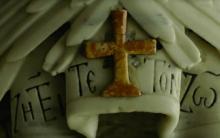
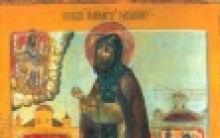
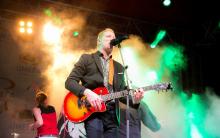

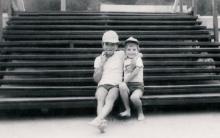
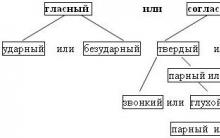




Conventional graphic symbols
The problem of the presence of petroleum products in water and how to deal with it See what “PND F” is in other dictionaries
About a six-day work week With a 6-day
What is a social worker?
Root hermitage in the Kursk region: the story of a miracle Root hermitage prayer service for the sick